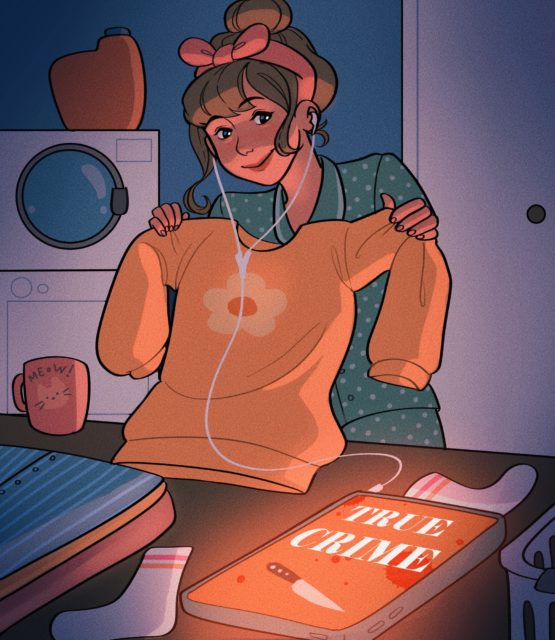People on the internet are increasingly embarking on stranger journeys – and the rise of the true-crime genre makes this all the more evident.
According to data collected from Parrot Analytics for the Ringer, a media-tracking company, true crime was both one of the biggest and fastest-growing documentary subgenres between May 2019 and April 2021.
So what sparked this sudden interest in the true crime genre?
Sociology professor Omar Lizardo said that social media has played a large role in popularizing true crime.
“I think that with social media networks, things that used to be kind of restricted to certain kinds of groups now have become part of a more general conversation and have become more popular than you would expect them to be,” Lizardo said.
According to an article in The Washington Post, TikTok played a role in popularizing true crime, especially with the recent case of Gabbie Petito, a 22-year-old girl who went on a road trip with her boyfriend and never returned.
According to AP News, the Petito case showcases the intersectionality between social media and the public’s fascination with true crime.
But for some Bruins, early experiences with true crime influenced their current passions and sentiments towards the genre.
Fourth-year psychology student Kaitlyn Reymond said that her exposure to true crime shows and podcasts coincides with her future career prospects.
“Growing up I would watch ‘Law and Order’ and stuff like that. And then when I finally listened on Spotify to podcasts, I found ‘Crime Junkies’ and it’s just interesting to me because … I want to go into the criminal justice field,” Reymond said.
Recent UCLA psychology graduate Rachel Teo said that listening to true crime podcasts brings to light cases that we need to know about.
“I actually learned a lot about, one, protecting myself as a female in today’s society, but also at the same time, it brings about a lot of awareness about these crimes that we don’t normally witness or hear from other people or see during our everyday lives,” Teo said. “It helps in getting justice for the victims and it helps with a police investigation.”
Reymond said that he also believes true crime podcasts are beneficial to society as a whole, as they help circulate resources for others.
“They add a lot of helpful hotlines, or they promote a lot of cases that are super old or cases that didn’t have a lot of attention …” Reymond said. “There are so many people that listen to podcasts, so if they are kids, they give out tip lines and all that.”
Although true crime podcasts are beneficial in bringing awareness to crimes, they can also have a negative impact, according to Lizardo.
“I think that it creates a false sense that you as a citizen can kind of contribute to the solution of things like crime,” Lizardo said. “… You have so many false positives and leads and then people are getting accused of things that they didn’t do…Solving crime is not a game and it’s much harder than people think it is from what is revealed.”
True crime not only influences the courses of certain cases, but also the mental health of individuals exposed to these stories.
According to HuffPost, true crime stories can cause spikes in stress levels and increased feelings of paranoia, which may prevent people from taking risks.
When listened to in excessive amounts, true crime can be detrimental and addictive, according to Lizardo.
“Even a single criminal case sometimes can generate kind of like, a little slice on the web where people become able to search various boards and Reddits. It’s just about anything that creates kind of this obsessive quality which I think could be detrimental for your regular life,” Lizardo said. “Any addiction can be negative.”
Teo said that true crime has both a positive and negative effect on her mental health.
“It is actually a stress reliever for me to be listening to true crime podcasts and having something that I am so passionate about and interested in,” Teo said. “But at the same time it does get me paranoid … you’re kind of like going straight to the worst-case scenario because you’re listening to so much of this.”
Bruins like Raymond said that they can still enjoy the genre in a healthy way by finding balance when choosing true crime media.
“I get to pick and choose what kind of stories I listen to, and I know if it’s something I don’t feel comfortable with,” Raymond said. “If I know it will affect me, I just won’t listen to it … but I think it can be effective.”

